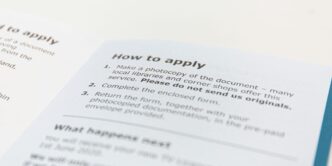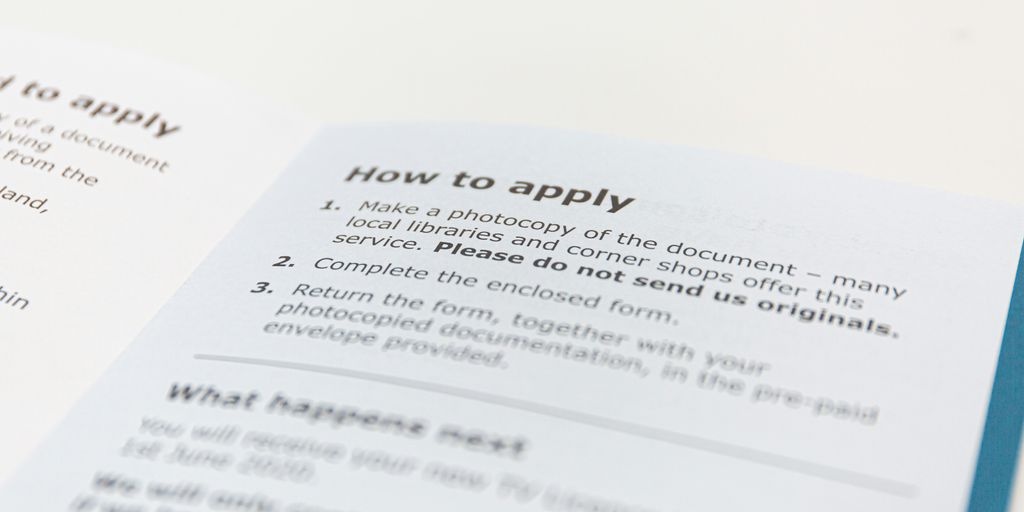Ever feel like your job application is missing that little something extra? You’ve got your experience and education down, but there’s this whole other part of the application that often gets overlooked: the additional information section. It’s not just filler; it’s a chance to really show who you are beyond the bullet points. Think of it as your secret weapon to make your application memorable. Let’s figure out how to use this space smartly.
Key Takeaways
- The additional information section on a job application is your space to add details that don’t fit elsewhere but are still relevant, like hobbies, certifications, or language skills.
- Using this section strategically can make your application more complete and show employers you’re a well-rounded person, not just a list of qualifications.
- What you put in this section should directly relate to the job you want. Think about how your interests or skills, even if they seem minor, could benefit the company.
- Keep it brief and to the point. Highlight the most important details first and use words from the job description to make sure it’s noticed.
- Always be truthful about what you list. Be ready to talk about any hobbies, skills, or experiences you include during an interview.
Understanding the Additional Information Section
So, you’ve got your resume all polished up, right? Experience is there, education looks good, but there’s this little spot called ‘Additional Information’ that often gets overlooked. Think of it as your secret weapon, a place to show off the stuff that doesn’t quite fit anywhere else but still makes you a more interesting candidate. It’s not just about filling space; it’s about giving the hiring manager a fuller picture of who you are beyond the bullet points of your job history.
What Constitutes Additional Information on a Job Application?
Basically, anything relevant that doesn’t have its own dedicated section counts. This could be anything from languages you speak fluently to certifications you’ve earned, or even hobbies that show you’ve got a bit of personality and drive. It’s a flexible part of your application, so what you put here really depends on the job you’re going for. For example, if you’re applying for a job that involves international clients, listing your fluency in Mandarin would be a smart move. Or maybe you’re a whiz with certain software that isn’t directly related to your main job duties but could still be useful.
The Strategic Importance of This Resume Section
Why bother with this section? Well, it’s a chance to really stand out. In a pile of resumes that all start to look the same, this is where you can add those unique details that make you memorable. It shows you’re not just qualified on paper, but you’re also a well-rounded individual. Think about it: a hobby like chess might suggest strategic thinking, or running marathons could show you have real grit. These aren’t things you can easily put in your ‘Work Experience’ section, but they tell a story about your character and potential.
Why This Section Elevates Your Job Application
Using the ‘Additional Information’ section wisely can seriously boost your application. It’s your opportunity to highlight skills or experiences that might not be obvious from your main qualifications. For instance, volunteer work can demonstrate leadership or teamwork abilities that you might not have had a chance to show in a paid role.
Here are a few examples of what can make a difference:
- Certifications: Listing something like a Project Management Professional (PMP) certification shows you’ve met industry standards.
- Language Skills: Being fluent in Spanish could be a huge plus for companies working with Latin American markets.
- Technical Skills: Advanced Excel skills or familiarity with specific design software can be directly applicable.
- Community Involvement: Leading a local charity drive shows initiative and organizational skills.
By including these kinds of details, you’re painting a more complete picture, showing employers that you bring more to the table than just the basic requirements.
Curating Your Job Application Additional Information
So, you’ve got your experience and education down pat, but what else can you put on your application to really make it pop? This is where the "Additional Information" section comes in handy. Think of it as your secret weapon to show employers you’re more than just a list of past jobs. It’s a chance to add those little details that make you unique and a great fit for the team.
Highlighting Relevant Interests and Hobbies
Your hobbies might seem like just fun pastimes, but they can actually tell a lot about you as a person and a potential employee. If you’re applying for a job at a tech company, mentioning that you build custom PCs or follow the latest gadget releases shows you’re genuinely interested in the field. Or maybe you’re into strategy board games; that could suggest you’re good at planning and thinking ahead. Even seemingly unrelated hobbies can hint at valuable traits. For example, running marathons shows dedication and perseverance, while playing a musical instrument might point to discipline and creativity. Just make sure whatever you list is something you can actually talk about if they ask.
Showcasing Certifications and Licenses
Got any special certificates or licenses? Definitely put them here! These are concrete proof of your skills and commitment to your profession. If you’re in IT, listing something like a CompTIA A+ certification shows you’ve passed a recognized industry standard. For marketing folks, a Google Analytics certification is a big plus. It tells employers you’ve gone the extra mile to get qualified and can handle specific tasks. It’s a way to say, "Hey, I’ve got the training and the credentials."
Leveraging Language Proficiency
In today’s connected world, knowing more than one language is a huge asset. If you can speak Spanish, French, Mandarin, or any other language, don’t keep it a secret. Be specific about your skill level – are you just starting out, or are you fluent? This is especially important if the company works with international clients or has a diverse customer base. Being able to communicate in another language can be a direct benefit to their business operations.
Detailing Technical Skills
This is your space to list any software, tools, or technical abilities you have that aren’t covered elsewhere. Think specific programs like Adobe Creative Suite for designers, coding languages like Python for developers, or advanced functions in Excel for data analysts. Don’t just list them; briefly mention how you’ve used them. For instance, "Proficient in SQL for data extraction and analysis" is much stronger than just "SQL." It shows you can actually apply these skills to get things done.
Showcasing Your Value Through Additional Information
So, you’ve got your experience and education down, but what else can you toss into your application to really make it pop? This is where the ‘Additional Information’ section comes in handy. It’s your chance to show them you’re more than just a list of job titles. Think of it as a little peek behind the curtain, showing off the stuff that makes you, well, you, and how that might actually help the company.
Demonstrating Community Involvement
Getting involved in your community says a lot about a person. It shows you care about more than just your own stuff, and often, these activities involve skills that employers look for. Did you help organize a local charity event? Maybe you volunteer at an animal shelter or coach a kids’ sports team. These aren’t just hobbies; they can show leadership, teamwork, and commitment. For example, leading a fundraising drive for a local school might demonstrate your ability to manage projects, motivate people, and achieve goals – all good things for any job.
Quantifying Your Contributions
Numbers talk, right? Instead of just saying you ‘improved efficiency,’ try to put a number on it. If you helped streamline a process, how much time did it save? Did you increase sales? By what percentage? Using figures makes your achievements concrete and much more impressive. It’s like this:
| Contribution Area | Before | After |
|---|---|---|
| Process Time | 4 hours/task | 2.5 hours/task |
| Customer Complaints | 15/month | 5/month |
| Project Completion Rate | 80% | 95% |
See? It’s way clearer what you actually did and the impact it had. This kind of detail really shows your value.
Connecting Skills to Employer Needs
Don’t just list skills; explain why they matter for this specific job. If the job description mentions needing someone detail-oriented, and you’re great at proofreading or managing complex spreadsheets, make that connection. You could say something like, ‘Proficient in advanced Excel functions, used to analyze large datasets and identify key trends, which aligns with the data analysis requirements for this role.’ It shows you’ve read the job description carefully and thought about how your abilities fit. It’s also a good idea to mention any awards you’ve received that are relevant to the job you’re seeking relevant awards, as this can effectively demonstrate your value to prospective employers.
Strategic Tips for the Additional Information Section
So, you’ve got this ‘Additional Information’ box on your job application, and you’re wondering what on earth to put in it. It’s not just a place to dump random facts about yourself; it’s actually a smart spot to give employers a little more insight into who you are, beyond the bullet points of your work history. Think of it as a chance to show you’re a real person with interests and skills that might not fit anywhere else but could still be a big plus for the company.
Ensuring Relevance to the Target Role
First things first, whatever you decide to put in this section needs to make sense for the job you’re applying for. If you’re going for a marketing job, mentioning your passion for social media trends or your experience running a personal blog is way more useful than saying you enjoy collecting stamps, unless, of course, you’re applying to work at a stamp museum. Always connect your additional details back to the job description. It shows you’ve done your homework and understand what they’re looking for. For example, if the job requires strong communication skills, highlighting your involvement in a debate club or your experience as a volunteer tutor can really help your case. It’s about showing how your life outside of work makes you a better fit for the role.
Maintaining Conciseness and Impact
Nobody wants to read a novel in the ‘Additional Information’ section. Keep it brief and to the point. Think about making each sentence count. Instead of saying, ‘I like to read books about history and science,’ try something like, ‘Avid reader of historical non-fiction and popular science literature.’ It sounds a bit more polished and takes up less space. If you have a specific achievement, like winning a local coding competition, state it clearly and concisely. A good rule of thumb is to aim for short, punchy statements that get your point across quickly. You want to grab their attention, not bore them with a long story.
Incorporating Industry Keywords
Just like the rest of your resume, this section can benefit from using keywords that are common in your industry. If you’re in tech, mentioning specific software or programming languages you’re familiar with, even if they aren’t directly related to the job’s core requirements, can show you’re engaged with the field. For instance, listing proficiency in a particular data analysis tool or a project management software can signal your technical awareness. It’s a subtle way to show you’re up-to-date and speak the language of the industry. You can often find these keywords by looking at job postings for similar roles or by checking out industry publications. This can also help if the company uses applicant tracking systems (ATS) to scan resumes.
Prioritizing Key Details
When you have a few different things you could include, think about what’s most impressive or most relevant to the job. Put the most impactful information first. If you have a certification that’s highly regarded in your field, that should probably come before mentioning you’re a fan of a particular sports team. Consider what will make the hiring manager think, ‘Wow, this person is really qualified and interesting.’ A table can be a good way to organize multiple certifications or language proficiencies:
| Skill/Certification | Proficiency Level | Notes |
|---|---|---|
| Spanish | Fluent | Lived in Spain for 2 years |
| Project Management Professional (PMP) | Certified | Managed cross-functional teams |
| Python | Advanced | Developed data analysis scripts |
This makes it easy for them to quickly see your qualifications. Remember, you want to make it as easy as possible for them to see why you’re a great candidate. You can find more tips on making your resume shine on career advice websites.
Authenticity in Your Job Application Additional Information
Being Honest About Proficiencies
This is a big one, folks. When you list a skill, whether it’s "proficient in Python" or "can juggle three oranges," you better be ready to back it up. Think of this section as a mini-interview before the actual interview. If you say you speak Spanish, be prepared for the hiring manager to ask you a question in Spanish. If you list "advanced Excel skills," don’t be surprised if they ask you to explain a VLOOKUP or a pivot table. Honesty here isn’t just good practice; it’s essential for building trust. Misrepresenting your abilities, even slightly, can backfire spectacularly. It’s better to be upfront about your current skill level and show enthusiasm for learning more. For instance, instead of claiming fluency, you might say "intermediate Spanish, actively studying." This shows initiative without overpromising.
Preparing to Discuss Listed Items
So, you’ve put down "volunteers at local animal shelter" or "enjoys hiking." Great! But what does that really mean for the job? Think about how these activities demonstrate qualities that employers look for. For volunteering, it might show compassion, responsibility, and a commitment to the community. Hiking could suggest perseverance, a healthy lifestyle, or an ability to handle challenges. Before submitting your application, jot down a few talking points for each item you list. This way, if they ask about your hobbies, you can connect them back to the job in a meaningful way. It shows you’ve thought about how your whole self fits into their company culture.
Avoiding Generic or Unsubstantiated Claims
We’ve all seen them: "Hard worker," "team player," "excellent communication skills." While these might be true, they’re also incredibly common and don’t tell the employer much. The "Additional Information" section is your chance to be specific and memorable. Instead of saying "good with computers," list the specific software or systems you’re skilled in. If you’re a "team player," maybe mention a specific project where your collaboration led to success. Avoid vague statements that could apply to anyone. Think about what makes you unique and how those specific traits or experiences can benefit the company. It’s about showing, not just telling.
Wrapping It Up
So, we’ve talked about how that ‘additional information’ spot on your job application isn’t just some extra space to fill. It’s actually a chance to show them who you are beyond the bullet points. Think of it as your little corner to highlight those unique skills, interesting hobbies, or extra certifications that make you a more interesting candidate. By being smart about what you include and keeping it relevant, you can really make your application pop. It’s all about giving them a fuller picture and showing them why you’re a great fit, not just on paper, but as a person too. Good luck out there!
Frequently Asked Questions
What exactly goes into the ‘Additional Information’ section of a job application?
Think of the ‘Additional Information’ section as a bonus round for your job application. It’s where you can share extra details about yourself that don’t quite fit anywhere else but still make you a great candidate. This could be things like special skills, volunteer work, or even interesting hobbies that show off your personality and what makes you unique.
Why is the ‘Additional Information’ section so important for my job application?
This section is super important because it helps you stand out from other people applying for the same job. It’s like giving the hiring manager a little peek into who you are beyond just your work history. It shows you’re a well-rounded person and can bring different skills and perspectives to the team, making your application more memorable.
What kind of things should I put in the ‘Additional Information’ section?
You should include things that are relevant to the job you want. For example, if you’re applying for a job that needs good communication skills, mentioning that you’re part of a debate club or volunteer as a tutor can be really helpful. Also, listing any special certificates or languages you know can show you’re dedicated and have extra abilities.
How can my hobbies and interests help me get a job?
It’s smart to mention hobbies or interests if they show skills the employer is looking for. For instance, if you love coding for fun, that’s great for a tech job. If you play chess, it might show you’re good at thinking ahead. Just make sure it connects somehow to the job or shows a positive trait like being a team player or having good problem-solving skills.
Should I include certifications, licenses, or language skills in this section?
Definitely! Listing things like certifications, licenses, or knowing different languages can really impress employers. It proves you’ve gone the extra mile to learn new things and have skills that can be directly useful to their company. It’s like having extra tools in your toolbox that others might not have.
Is it okay to be creative or stretch the truth in the ‘Additional Information’ section?
Always be truthful! Only list skills or experiences you actually have and are comfortable talking about. If you say you know a certain software, be ready to explain how you’ve used it. Being honest makes you seem trustworthy, and employers appreciate that they can rely on what you’ve shared.














